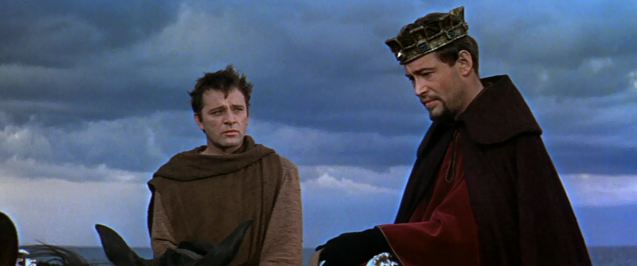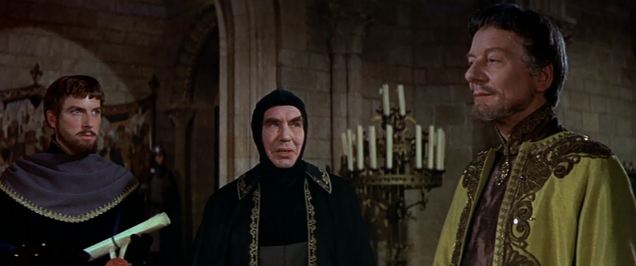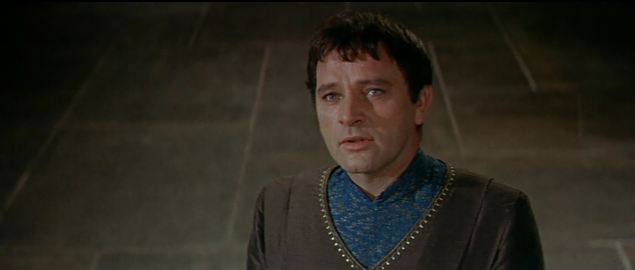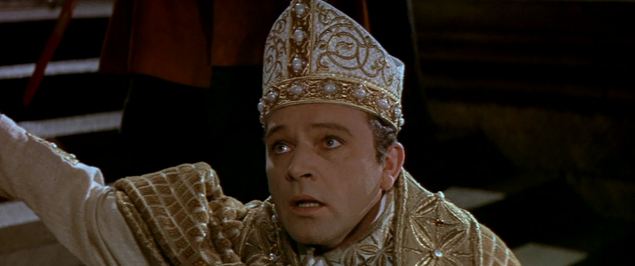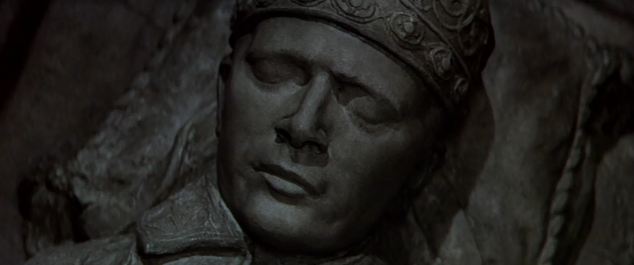Some films — example, Becket 1964 — become history lessons for their generation. In this case I know of at least one uncle (died in 2011) for whom this film was as good as it got. He loved quoting lines from it, such as this from Peter O’Toole: ‘You see I really am your friend, and you are wrong not to love me.’ Historically, I guess some of the basic facts stand, although perhaps most of the pleasure will be waiting — waiting — waiting — for Peter O’Toole to say ‘Who will rid me of this troublesome priest?’ After that you just know what’s going to happen. There are a few burly knights standing nearby, and they look at each other for a moment and then leave the room quietly.
The performances from both Richard Burton and Peter O’Toole in Becket are epic. Richard Burton is quiet, restrained and handsome, and yet still gets to do some trademark shouting as he excommunicates Lord Gilbert. Peter O’Toole is all over the place — boorish, frantic, forlorn, raging, carefree, hostile, tragic, comic, the lot, in a performance that is a perfect counter to the solidity of Richard Burton. This being based on a play by Jean Anouilh, there are also plenty good lines in Becket, and that’s when you can count on full on Burton.
Extra Wolfitt; extra Gielgud.
As for real historical accuracy in Becket, I’m not so sure this film is a sin. History is an art and not a fact, and can be told in many ways and for many purposes. Much of the time, the fault is ours for assuming that history is factual. Many plot points revolve around Becket being a Saxon who has risen to a perceived Norman social standing, when in fact the historical Thomas Becket was a Norman (while Henry was an Angevin).
Actually, Anouilh was made aware of this historical error before his play was produced (he had based the play on a 19th-century account that described Becket as a Saxon), but decided against correcting it because the story was better the way he had written it, and because "history might eventually rediscover that Becket was a Saxon, after all."
The cast is good: Richard Burton, Peter O’ Toole, John Geilgud and Donald Wolfitt. Also you’ll see Peter Jeffrey is what may have been his first film role — he plays one of the murderous (but helpful) knights.
Becket is one of the most pleasurable films of its time. There are strong introductory scenes, including a funny opening which sees Burton and O’Toole a-wenching in the fashion the viewers in the 1960s most enjoyed — and once the drama commences, it never lets up, because it doesn’t resort to lazy time-killing romance scenes, or boring battle footage either.
Neither is there sentiment contained — by which I am talking about the kind of manipulative tosh and turn of a film like Braveheart, which conformed to the letter to the late twentieth heart stringing adored by the audiences of Steven Speilberg, by inserting romance where there was no call for any and much other unnecessary fluff.
When history hits the big screen it always needs to be glossed, and this can be done in several ways. In Becket, the gloss is not self-conscious, and it doesn’t need to be either, because it is old fashioned enough to conform to dramatic principles before spectacle, or climactic necessity. The done thing these days is to insult this in as many different ways as possible, primarily by exposing historical inaccuracies, and while you can be sympathetic to this, it is not criticism but more of the sort of know-it-all-ism that seeks to raise the writer above the material.
Richard Burton is great, there is no doubt of it and the film is spectacular and engrossing, if you’re able to tolerate the cinematic conventions of its day. The script lingers longer than you may expect and if all else fails, you can enjoy Burton and O’Toole, simply as they are.
If you’re worried about history, and care that the fork mentioned in the film appears 400 years too early — then just get on with your 'fork off' jokes the best you can.

